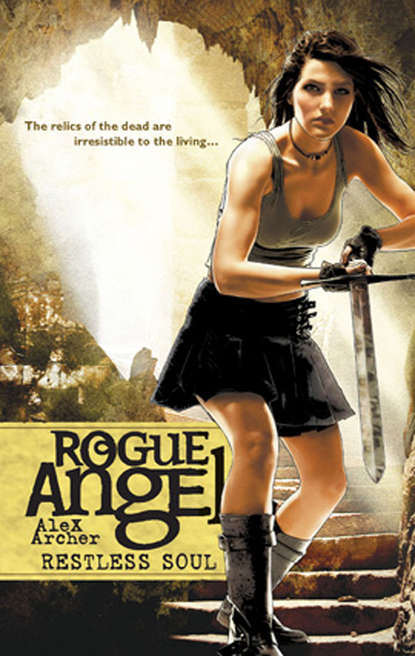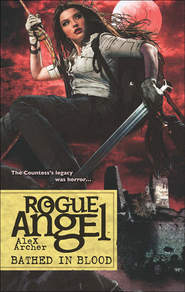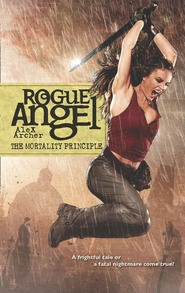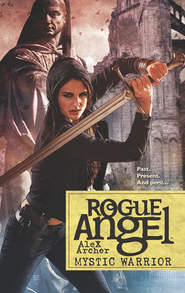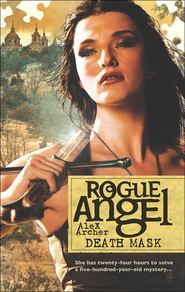По всем вопросам обращайтесь на: info@litportal.ru
(©) 2003-2024.
✖
Restless Soul
Автор
Год написания книги
2019
Настройки чтения
Размер шрифта
Высота строк
Поля
Luartaro was quick to pay the guide, whispering to Annja that the pamphlet said there would be a charge to enter the cave and for the raft.
After passing out small water bottles, Zakkarat led the way. He had a quick gait and was nimble, ducking under branches and stepping over ruts, and Annja put him closer to thirty for it. He chattered as he went, pointing first to the tops of the mountains and mentioning the mist. They were unlike other mountains she’d traipsed through, certainly unlike the familiar Rockies and the mountains she and Luartaro had combed through for the ancient penguin remains. These peaks had been weathered away into twisted shapes and odd-looking knobs largely covered by jungle. They were beautiful and ghostlike in the mist.
She regretted not bringing her camera. Luartaro wasn’t taking as many pictures as she would have, or from what she deemed the proper angles. The path Zakkarat took was wide and flat from the traffic of countless tourists. To the sides stretched swaths of dark green moss, still shiny from yesterday’s rain.
Though practically everything was green, there were remarkable variations, Annja noted. Some of the leaves were so pale they appeared bleached bone-white by the sun. Others were a deep green that looked like velvet. Shadows were thick near the ground where the large leaves reminded her of umbrellas. If there were patterns to the colors and light, she couldn’t discern them—everything was a swirl.
Had someone taken a picture of the scenery and turned it into a jigsaw puzzle, it would be one of the most difficult ever to assemble, she thought.
Annja listened intently to hundreds of tiny frogs that chirped like baby birds. After a mile, she spotted a fence far to her left, and a tilled field beyond. On the opposite side the ground rose at a steep angle, and she wondered if there were caves beneath.
A bit farther along, the Australian man drained his water bottle and looked at his watch. “My feet are hurtin’, Jennie,” he said. His wife smiled sympathetically and pointed to a thin river that meandered out of the fields to their left. It widened as they kept walking, eventually paralleling the path, which had started to narrow.
“More than two hundred caves in Pan Mapha in Mae Hong Son alone,” Zakkarat announced. He numbingly rattled off facts about their length in meters and feet with so little inflection that Annja guessed he’d been repeating his speech and leading tours so long that he was bored by it all. “This cave we go to, a most popular spot. Tham Lod Cave does not need climbing equipment. Easy on the feet, yes?”
Good for most of the tourists, Annja thought, wishing for something a little more adventurous and taxing.
The path narrowed to the point they had to walk single file, and Annja noted faded signs tacked on trees written in Thai and English advertising a bird show. They’d obviously been posted years earlier, and she wondered if the show still continued and, if so, what it entailed.
They came to a fork in the trail. Zakkarat pointed to his right and said, “Temple. Tours available there, too.” Through the mist, Annja could barely make out a large stone building with hints of ornate corners. The other course, the one they followed along the river, led to an old wooden gate that hung off its hinges and which they easily stepped through.
The path became rougher, and gnarled tree roots poked through here and there. Zakkarat slowed his pace and jabbed his finger at the largest roots.
“Take care,” he warned. “Take care that you do not trip.” He nodded to another sign advertising a bird show. “Going out with a big group tomorrow night for the birds.”
“So there is a bird show,” Annja mused.
“Ain’t there birds out now?” This came from Jennie, who was looking up into the trees and alternately watching her husband, who was still grumbling about his feet.
Apparently, she’d not noticed the other bird-show signs.
“Ah, there’s a red one with black streaks on its wings.” Jennie pointed. “And there’s another red one. So what’s with the bird show? Are they trained? Parrots?”
The ecotourist wife answered before Zakkarat had a chance. “We’re in the bird group tomorrow night,” she said. “At sunset, all the bats fly out of the cave we’re going to right now and a colony of swifts fly in. Trading places, if you will. There are supposed to be three or four hundred thousand of them. The swifts have adapted to living in the cave and hang on the stalactites like they would tree branches. This is the only place in the world this happens, I’ve heard. We bought some ultra-high-speed film for it. No digital camera for me.” She pointed to the expensive-looking camera around her neck.
“You can come back tomorrow to see the birds if you want, Jennie. I’m not walking back out here again,” the Australian husband announced. “I’m too old for this nonsense. My blisters have blisters. I’m picking our next holiday. A beach somewhere so I can park my bum. Maybe Hawaii? Or Aruba on some package deal?”
The river practically butted up against the path as they made their way. They stopped at a collection of small huts, one of which offered concessions, another of which shaded a dock. It was thirty more baht per person for the bamboo raft ride to the cave.
Luartaro and Annja were the first couple on board.
Zakkarat used a pole to edge the raft away from the bank. “Not deep here,” he said. “But it is wide. Taking this raft is better than wading, yes? Stay dry by taking this raft. The Shan tribe provides the rafts and gets the baht here. That is good.”
He pointed to a woman and child near one of the huts. “Tourism money has cut the Shan’s need for slash-and-burn rice farming. That is very good.”
“Are you a member of the Shan tribe?” Luartaro asked.
“Yes. All the people in my tribe respect the caves and their creatures—the birds, bats, fish and snakes. The tourists who come to see the caves are helping our community.”
The raft floated with the current for several minutes before Zakkarat poled it to a stop against the opposite shore and motioned his passengers to get off.
A young boy collected a few more baht from everyone.
The cave loomed sharply to the right, and Zakkarat took the lead and gestured to a half-dozen crude wooden steps that had been built next to the entrance.
“Follow me, please.”
Annja took the first spot in line and was quickly swallowed by a cavern filled with stalagmites, small sinkholes and vents.
The change in temperature hit her immediately. The air was cool from her knees down, closest to the ground. Above that it remained warm and humid. The light had changed, too, and Annja closed her eyes for a moment. When she opened them, they had adjusted better to the dimness.
She looked up, but couldn’t see the ceiling; it was lost in overlapping shadows dotted with the tips of stalactites.
“Cave elephant,” Zakkarat said, pointing to a formation of rock and limestone that had been fashioned by water dripping across it through the centuries.
Annja could make out the broad shape of it and the outline that could be construed as ears and a trunk.
“Cave dog. Cave monkey.” Zakkarat pointed to other limestone formations that were not quite so easy to make out. “Cave crocodile.”
The ecowife pointed to one that looked like a snake and snapped a picture of it.
Annja shielded her eyes as the woman took another picture and then another, the flash in the darkness almost painful in its sudden brightness.
“So it’s called a spirit cave because of the animal spirits that fill it, right? Spirits in the lime, I guess you could call them,” the ecowife said.
She took several more shots of other formations in rapid succession and of the natural limestone columns that extended twenty meters or more to the ceiling.
“Spirits of dead animals? No.” Zakkarat chuckled. “Some of the local tribes claim that the souls of the human dead live here. That is why it is called a spirit cave. Those tribes, but not the Shan, will not come here. They fear for their lives. Some other tribes, they are not so superstitious. It is these tribes, but not the Shan, that stole most of the artifacts that were here. But there are some pieces, not so good, for you to see. I will show you.”
The group edged deeper into the cave, and bats, hidden by the shadows, started squeaking.
Zakkarat picked up a gas lantern from the floor and lit it. The squeaking grew louder as the light grew brighter. A mud-colored snake slid across the path and toward the wall.
“This is all so beautiful,” Annja said.
“Yes,” Luartaro whispered. “Though not so beautiful as you.” He took a few pictures of her looking at one of the limestone formations, bouncing the flash so it would not be so disturbing.
They both stared at the immense chamber striped with earth colors and shining in the meager light.
No matter how many caves Annja had traipsed through, she never really tired of them and was always amazed by what magnificent formations nature had sculpted.
Annja felt relaxed in the cave, though she knew from their mannerisms that some of her companions, the Australian husband in particular, were made uneasy by the surroundings. The sense of foreboding she’d had the night before seemed far away.
They walked on, following the bobbing light of Zakkarat’s lantern.
Annja could hear moving water a few minutes before they reached another river, or perhaps a branch of the same one.
Zakkarat indicated another bamboo raft.





